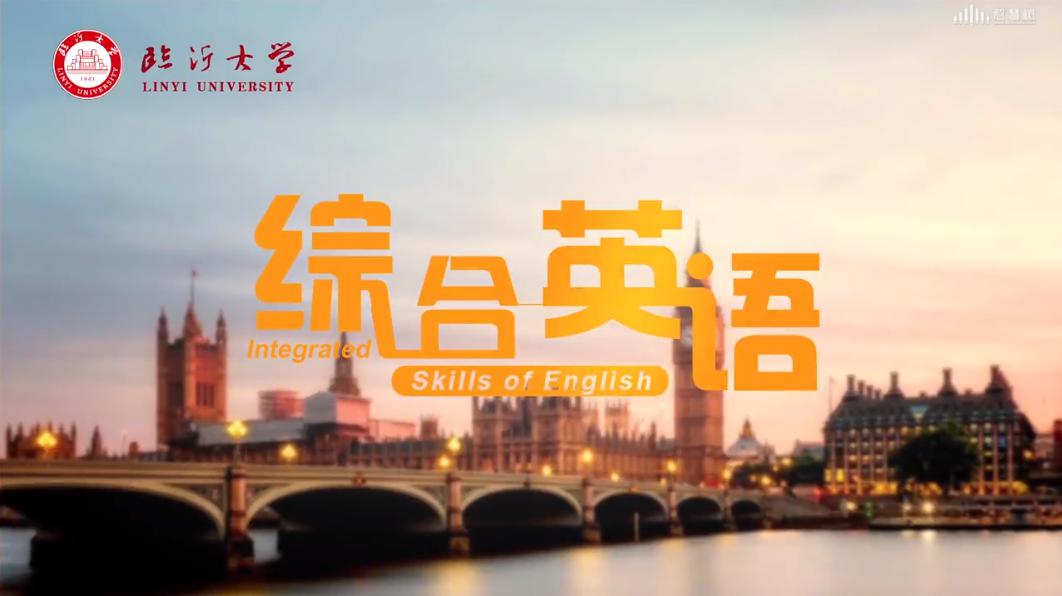-
第一章My Father
In this unit, we will not only learn to use English for describing a person, but also learn how to use English for managing relationship and mutual understanding in personal life. At the same time, we will learn to use English to analyze human relationships by discussing generation gap.
-
●1.1Generation Gap
In this episode, generation gap will be discussed and expressions of managing relationships and mutual understanding in personal life will be provided.
-
●1.2Text Analysis
In this episode, we’ll learn the writing features of the text and have an analysis of the text.
-
●1.3Figurative Language: Alliteration
In this episode, we’ll talk about alliteration from three aspects: the definition of alliteration, the effect of alliteration and the usage of aliiteration.
-
●1.4Description of People
In this episode, we’ll learn how to describe a person from two aspects: appearance and personality.
-
第二章Why My Great-uncle Gave up the Ministry
In this unit, we will continue to learn how to describe a person with detailed description and appreciate humorous language, helping students to adopt a right attitude towards life and cultivating their critical thinking.
-
●2.1Dealing with Clumsiness
In this section, we will get acquainted with the defintion and the synonymous expressions of clumsiness, together with how to deal with it properly.
-
●2.2Elaboration of the "Accidents"
In this section, we are to probe into the three "accidents" illustrating clumsiness.
-
●2.3Writing Technique: Detailed Description
In this section, we are to appreciate the special writing technique empoyed to make the text both humorous and magnetic.
-
●2.4Redemption: Giving up the Ministry
In this section, we will try to analyze and reveal the implicit reasons that urged the writer's great-uncle to give up the ministry.
-
第三章Saved by his Mistakes
In this unit, we’ll not only learn to use English to talk about nature, animals and pets, but also we’ll learn how to use English to talk about problems or difficult situations. By discussing animal behavior through discourse analysis, we’ll talk about the skills in narrative writing.
-
●3.1Human, Nature and Animals
In this episode, we’ ll mainly discuss the relationship between nature and humans, humans and animals, humans and pets.
-
●3.2Figurative Language: Irony
In this episode, we’ll discuss one figure of speech---irony from four aspects : the definition, the function, the types and the use of irony in the text.
-
●3.3Clauses in the Text
In this episode, we’ll have a revision about attributive clauses, noun clauses and cleft sentences.
-
●3.4Narrative Writing
In this episode, we’ll talk about the writing skills in narrative writing and have an analysis of the writing skills in the text.
-
第四章Bargains
In this unit, bargaining strategies is firstly illustrated. Then we will analyze the text from the structure and the language style, followed by figurative language, analogy. Lastly, we’ll talk about the illustrative writing.
-
●4.1Bargaining Strategies
In this episode, the understanding of bargaining and some bargaining strategies would be talked about.
-
●4.2Text Analysis
This episode mainly analyzes the text from the structure and the language style perspective.
-
●4.3Figurative Language: Analogy
What is the definition of analogy, a special form of comparison? What are the main differences between analogy and comparison? How to use it properly? All these questions will be discussed in this episode.
-
●4.4Illustrative Writing
In this episode, we’ll talk about illustrative writing and have an analysis of the writing skills in the text.
-
第五章Out of Mists
In this unit, we will learn to use English for talking about reminiscences of childhood, talking about the effectcs of war, and talking about girls' education in the Vicotorian Age and in modern world.
-
●5.1Memories of Childhood
In this episode, we'll learn to talk about the beautiful and miserable memories of our childhood and have a better understanding of the effects of childhood experience.
-
●5.2Text Analysis 1
In this episode, we'll learn to know the narrator's impression of the war and understand the brutality of war.
-
●5.3Text Analysis 2
In this episode, we'll learn to know he narrator's memory of strict home eduction, know grils' education in the Victorian Age, and understand the importance of girls' education in modern world.
-
●5.4Figurative Language in the Text
In this episode, we'll learn to know and identify the figurative language such as "transferred epithet" and "allusion", and appreciate their power in the discourse.
-
第六章Learning a Language
As language learners, we have many puzzles or difficulties in language learning. This text discusses three misconceptions held by common language learners and it is hoped to enlighten language learning.
-
●6.1Why do We Learn a Language
It discusses the definition, importance of a language, and the English learning experience.
-
●6.2Text Analysis
It mainly analyzes how the author refutes the three misconceptions held by common language learners.
-
●6.3Figurative Language: Metaphor and Analogy
In this section, the making of a metaphor is introduced and it goes further to discuss the differences between metaphor and analogy.
-
●6.4Creative Use of Words
Diction is the choice and use of words, and this section introduces how to use words creatively based on the analysis of the text.
-
第七章I Wandered Lonely as a Cloud
In this unit, we will learn to use English for talking about tourism, analysing the poem "I Wandered Lonely as a Cloud", discussing the heritage of the Lakes and describing a place.
-
●7.1Significance of Traveling
In this episode, we will learn to know the significance of traveling and appreciate the unique charm of the Lakes.
-
●7.2Poem Analysis: I Wandered Lonely as a Cloud
In this episode, we will learn to analyze a poem and appreciate the poem "I Wandered Lonely as a Cloud".
-
●7.3Writers Nourished by the Lakes
In this episode, we will learn to know about the great writers nourished by the Lakes and understand the impact of nature on the writiers.
-
●7.4Description of the Lakes
In this episode, we will learn to know how to describe a place and understand how the Lake District id described.
-
第八章Time to Stop Excuses for Lateness
In this unit, by analyzing the culture differences in time concept between the Westerners and the Easterners, we’ll learn about the writer’s argument in his writing. At the same time, we’ll learn the writing skills in refutation. In this unit, we'll not only learn some expressions about work ethic and employment, but also learn some expressions about observing rules or disciplines in a work place.
-
●8.1Time Perception in East and West
In this episode, we'll talk about the different time concept between the West and the East.
-
●8.2Text Analysis
In this episode, the text will be analyzed and we’ll get the argument of the writer's.
-
●8.3Figurative Language: Metaphor
In this episode, we’ll talk about one figure of speech- metaphor from three aspects: the definition of metaphor, the classifications of metaphor and the use of metaphor in the text.
-
●8.4Refutation Wrtiting
In this episode, we’ll discuss the writing skills in refutation and the writing skills in the text.
-
第九章Package Design
In this unit, we'll firstly talk aout some essentials of pacakaging,including the importance, functions of packaging. Then we will analyze the text from the structure and the language style, followed by how to describe objects and animals. At last, something about marketing, the relations between packaging and branding will be discussed.
-
●9.1Essentials of Packaging
This episode will mainly illustrate some essentials such as the importance, the functions and the features of packaging.
-
●9.2Text Analysis
This episode mainly analyzes the text from the structure and the language style perspective.
-
●9.3Description of Objects and Animals
In this episode, we'll analyze how to describe some objects and animals.
-
●9.4Marketing: Packaging and Branding
Some problems will be solved in this episode, such as the definition and functions of marketing,the relations between packaging and branding.
-
第十章The Dream of an Hour
In this unit we will learn to use English for talking about personal conflict in life, taking about the basic elements of a short story and recognizing the values of figurative language used in "The Dream of an Hour".
-
●10.1Why Bother with Marriage
In this episode, we will learn to know about marriage, and undersand the do's and don'ts in marriage.
-
●10.2Plot and Setting in the Story
In this episode, we will learn to know the importance of plot and setting in a short story, and understand how the scenery in the story is depicted and its function.
-
●10.3Characterization of Mrs. Mallrad
In this episode, we will learn to know the character and characterization in a short story, understand how Mrs. Mallard is portrayed, and perceive the complexity of human nature.
-
●10.4Symbolism and Irony in the Story
In this episode, we will learn to know where and how symbolism and irony are used, and apprectiate the charm of the symbolic and ironical language.
-
第十一章Science and Art
In this unit, we are to have a deep understanding of one of the medical advances in our century---the organ transplants, to learn about expository writing and to analyze some long sentences in the text.
-
●11.1Organ Transplant: Shortage and Solution
In this section, we are to expound the current situation of organ transplants and try to propose solutions to the problem of organ shortage.
-
●11.2Expository Writing Techniques
In this section, we are to get a basic idea about expository writing and some specific writing techniques on the basis of text analysis.
-
●11.3Long Sentence Analysis: Decomposition and Combination
In this section, some of the long sentences are analyzed, through which we are to learn how to decompose long sentences and how to combine simple sentences into longer ones.
-
●11.4Ethical and Social Reflections of Organ Transplants
In this section, we are to explore the ethical and social problems faced by organ transplants.
-
第十二章The Power of Beliefs
In this unit, we are to discuss personal beliefs and superstitions and explore effective methods to present evidence.
-
●12.1Superstitions in Daily Life
In this section, we will get acquainted with superstitions, including its definition, origin, and the proper attitude we should adopt towards it.
-
●12.2Text Analysis
In this section, we are to elaborate the basic concepts of argumentative essay and probe into the structure of the text.
-
●12.3Providing Evidence: the Use of Contrast
In this section, we will get acquainted with the method of comparison and contrast and elaborate its application in presenting evidence in our text.
-
●12.4Providing Evidence: the Use of Illustration
In this section, we will get acquainted with the method of illustration and elaborate its application in presenting evidence in our text.


